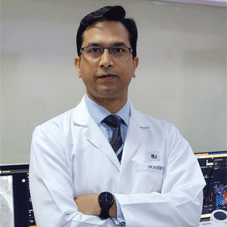
Dr. Vivek Kumar
Senior Cardiologist
Aided by modern scientific innovation, the boundaries of medical technology have extended to unimaginable limits and so have the roles of doctors in society. Leading the healthcare industry of South Delhi, Dr. Vivek Kumar, Cardiologist, at Indraprastha Apollo Hospitals, and Hridayica Clinic is one of the best heart specialists and cardiologists in the region with 14 years of exclusive experience. He is a leading structural heart interventionist and cardiac electrophysiologist in Delhi because of his expertise and training in the latest technology of valve transplant known as TAVI and arrhythmia care. Vivek possesses an unrivalled set of cognitive skills, an analytical and logical worldview, and a combination of theoretical knowledge and practical experience related to cardiac medicine which enables him to attend to the detail of his patients and make decisions quickly in difficult circumstances.
Additionally, he has published research papers in various National and International publications which include papers in coronary intervention, cardiac electrophysiology, and structural heart intervention. He has also been credited for discovering a rare congenital anomaly of the venous system in the heart and giving it the name of Coronary Venocardinal Vein. Currently, as the best interventional cardiologist at Indraprastha Apollo Hospital and Hridayica Clinic, Vivek is leveraging his expert knowledge in coronary artery disease, peripheral artery disease, aortic disease, and other serious heart maladies to save thousands of lives every day. Let’s hear it from him.
When Doctors Will Be Able To Create A Personal Touch That Is Virtually Transmitted To Patients During Consultations, That Will Be The Next Great Innovation In Healthcare Delivery
Tell us about the innovations that are happening in the field of cardiology. What is your focus of work at Indraprastha Apollo Hospital?
I am extremely excited to be a part of the innovations that are taking place in the field of cardiology and the new discipline in interventional cardiology. Earlier, interventional cardiology meant putting stents in the blood vessels of the heart which was an alternative to open-heart surgery. But the problem with the aging population is that they are a very high-risk population and has a lot of comorbidities. They mostly have all other issues related to other organs of the body in addition to their heart problem. This makes treatment and surgery very risky. In such cases, structural heart intervention comes to play. Structural Heart Intervention is a way of treating valve disorders without openheart surgery. This new interventional discipline in cardiology is my focus of work at Indraprastha Apollo Hospital.
What are the latest challenges hindering people from making the right lifestyle choices?
We often come across people living in denial about their problems. I have seen patients who are unwilling to take medicinal treatment for cardiac risk factors. This may be because of a lack of education or awareness about the problems that may lead to serious health consequences. Like for example the risks involved with high blood pressure are very silent; it usually doesn't cause much trouble initially. But gradually and progressively they internally damage our body system and ultimately manifest in a very serious form of problems resulting in heart attack, heart failure, or stroke. The main problem, I believe, is the awareness of the dangers and negligence regarding the risk factors of heart problems.
Could you reflect on some of the toughest challenges you have encountered in your journey so far? How did you overcome them?
The biggest challenge that we as cardiologists face is conveying the patient regarding the treatment options. Most of the time patients come to us in a state of confusion and guiding them in the right direction is the toughest challenge. In my opinion, having transparency in communicating with patients i s v ery i mportant. W hen w e t alk a bout the benefits of the procedure, it’s crucial that we also talk about its limitations. We as physicians or cardiologists should offer our patients a chance to give informed consent where they know the benefits and risks of the procedure and parallelly build up confidence and faith in them letting them know that they are in safe hands. It is a difficult path but most of the time I feel that being honest with my patients about procedure outcomes wins the battle.
What advice would you give to the upcoming healthcare industry leaders?
We are going through a period of a paradigm shift in healthcare where Covid brought a lot of innovation. Physical consultations were a norm before, but now more and more people are involved in telemedicine or virtual consultations. So, it brings a lot of potential to this industry and many more innovations can be done in this field where consultations can be done by a noncontact method. It is seen that patients from small cities wander to bigger cities for better healthcare options which in itself carries a lot of costs. So, I believe there is still abundant scope to innovate in terms of technology in this field. When doctors will be able to create a personal touch that is virtually transmitted to patients during consultations, that will be the next great innovation in healthcare delivery.
Dr. Vivek Kumar, Senior Cardiologist, Hridayica Clinic
A Gold Medalist in MBBS from Nalanda Medical College and a Doctorate of Medicine in Cardiology from the Institute of Medical science Varanasi, Dr. Vivek Kumar has 14+ years of experience and in-depth knowledge in the field of Cardiology and is a leading cardiologist in South Delhi capable of handling even the most delicate issues with ease and efficiency.
Awards & Recognition:
Presented complex cases at various international forums including Euro PCR in 2015 and AICT ASIA PCR in 2019



.png)